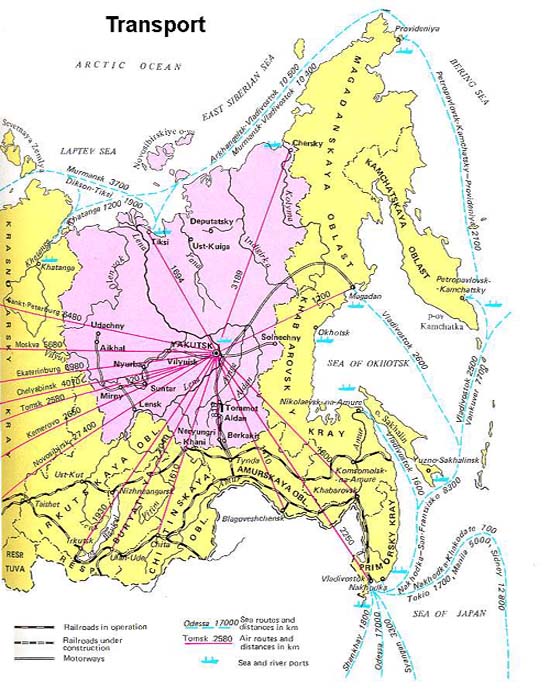
Considering the data below and the map above, we can see how important
it is for a main artery of the Russian Rail system to connect with
Yakutsk.
| Republic Area: 3,103,000 sq.km. |
| Republic Population: 1,061,000( at 01/01/94) |
| Republic Capital: Yakutsk |
| Capital Population: 194,000( at 01/01/94) |
Here is an article about recent plans for the realization of this long
needed project.
BBC Monitoring
Russia revives plan to build Siberian railway
Source: RTR Russia TV, Moscow, in Russian 1300 gmt
13 Oct 03
[Presenter] It's been decided that the construction of a mainline railway
to Yakutsk, which was launched way back in
Soviet times but is yet to be
completed, will be seen through to the end. The project has been revived
after the levels of water in the Amur and the
this year, so much so that it jeopardized the delivery of supplies to
Yakutia:
[Correspondent] It was Nicholas II who first had the idea to build a
railway to
in for criticism in the very first issue of the Bolsheviks' newspaper,
The
Iskra, on
[Correspondent] The Communists themselves then
tried to put things right
where their predecessors went wrong. So the construction of a railway
began. Work to build a railway to
as the construction of the Baykal-Amur Mainline
was over. However, less
than half was built. With the collapse of the
money. At present, as a result, most areas in Yakutia
are accessible by
river transport, by car or by air. There is no railway.
This situation makes it very expensive to bring supplies to Yakutia.
Annually, the cost of northern deliveries is put at R8bn, with R4.5bn an
allocation from the federal centre. Road and river transport now account
for most of the delivery of northern supplies to the republic. The problem
is that, because of poor roads, road transport takes far too long to cross
the taiga. As for the River Lena, the level of water in it has dropped
very
considerably, so much so that it jeopardized this year's northern
deliveries. This alone is reason enough that a railway is necessary ,
Vladimir Yakovlev, deputy prime minister in
the Russian government, thinks.
[Vladimir Yakovlev, deputy prime minister]
I'll certainly support it, as I
have said on a number of occasions. It became particularly obvious when
the
level of water dropped in the
course of action to sit on our hands until something bad happens.
[Correspondent] The Railways of Yakutia joint-stock
company has already
built a line to the town of
erected here. Now, this unique structure - for not every nation can build
a
bridge in the conditions of permafrost - is unused. The total cost of
building a railway to
attract private finance to do it. As an incentive, concessions will be
offered to develop various deposits, of which there are quite a few, along
the route which has been chosen for this railway.
When the railway to
be cut by some 30 per cent. To people in Yakutia
, it will mean lower prices
for food, petrol and fuel oil. To the Russian budget, it will mean that
the
money thus saved could be spent elsewhere, and there is no shortage of
candidates.